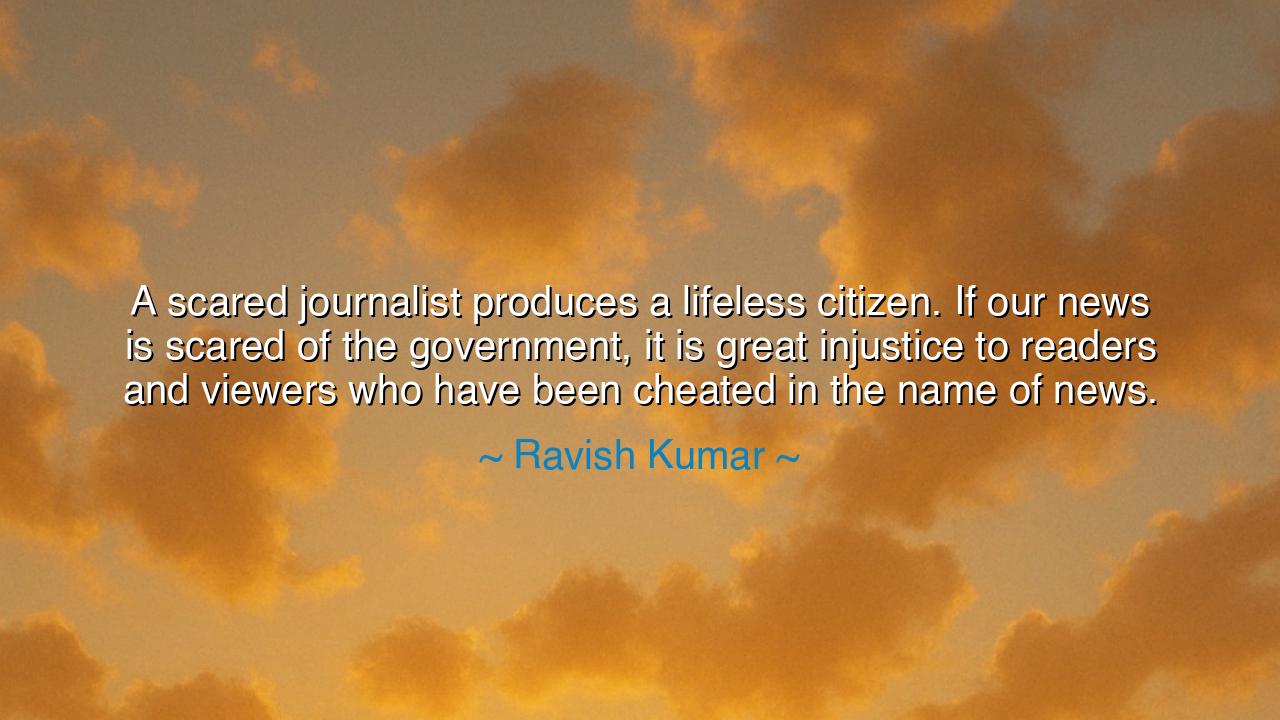
A scared journalist produces a lifeless citizen. If our news is
A scared journalist produces a lifeless citizen. If our news is scared of the government, it is great injustice to readers and viewers who have been cheated in the name of news.






In the gathering darkness of our age, when truth trembles before the throne of power, the journalist Ravish Kumar uttered words that cut through the fog like a torch of fire:
"A scared journalist produces a lifeless citizen. If our news is scared of the government, it is great injustice to readers and viewers who have been cheated in the name of news."
These words, fierce and mournful, speak not only of the death of journalism but of the slow dying of democracy itself. For when fear silences the messenger, the people are left deaf to the cries of truth. And when those who write, speak, and question become servants to power instead of witnesses to it, the soul of a nation begins to decay — quietly, invisibly, yet fatally. Ravish Kumar’s lament is thus both a warning and a prophecy: that the courage of the journalist is the lifeblood of the citizen, and that when courage dies in the newsroom, liberty dies in the streets.
In the ancient kingdoms of the earth, truth was often a perilous thing. The scribes and chroniclers who dared to write against kings were punished with silence or death. Yet from time to time arose voices too fierce to be tamed — men and women who believed that to serve truth was holier than to serve rulers. So too in our modern age, the journalist stands as the last sentinel between power and the people. He is the torchbearer of democracy, the voice of the voiceless, the question that authority fears most. But when fear grips this sentinel — when he bows to power, or hides behind comfort — the people lose not merely information, but the very spirit to question.
Consider the story of Anna Politkovskaya, the Russian journalist who wrote fearlessly about corruption and war. She knew that every word she printed might be her last, yet she continued, because silence, she said, was a crime greater than death. Her murder did not only silence a journalist; it struck at the heart of every reader who had learned to trust her pen. This is what Ravish Kumar means when he says that a scared journalist produces a lifeless citizen — for when those who inform us are afraid, we, too, learn to live in fear. We stop asking, stop seeking, stop resisting. And thus, we become the docile subjects of those who would rather rule than serve.
The news, once the pulse of a living democracy, becomes then a shadow of itself — a spectacle without substance, a song without truth. When journalists trade truth for favor, or silence for safety, the people are cheated in the name of news. They are told they are informed, but in truth, they are blinded. The grand illusion of freedom remains — the newspaper still arrives, the screens still glow, the anchors still speak — but what they carry is not truth; it is obedience dressed as information. And in such a world, tyranny no longer needs chains or prisons, for it rules through deception, through fear disguised as order.
Yet the wisdom of Ravish Kumar is not despairing — it is a call to remembrance, to courage and conscience. He reminds us that journalism, at its truest, is an act of faith — faith in the people’s right to know, and in the power of words to challenge the mighty. The journalist, in his purest form, is a warrior of light who fights not with weapons, but with questions. His armor is integrity; his allegiance is to truth alone. And his greatest enemy is not censorship — it is fear.
History, too, bears witness to this eternal struggle. When the American press revealed the Watergate scandal, it was not merely the downfall of a president — it was the triumph of truth over intimidation. When the Indian Emergency silenced the press, it was the underground journalists who preserved the flame of freedom. In every age, when tyranny rose, it was brave reporting that exposed its face. And in every age, when the press grew timid, the rulers grew tyrannical. Thus, the health of democracy is measured not by the might of its leaders, but by the fearlessness of its truth-tellers.
So hear, O seeker of justice and truth: never take the voice of the press for granted. Support those who question, protect those who speak, and reject those who serve only the powerful. For as the body needs air, so does the mind need truth. A nation that silences its journalists prepares its own tomb. A people who tolerate lies invite chains upon their souls. Let us then honor those who speak even when their voices tremble — for their courage is the last wall between freedom and silence.
Thus ends the teaching: when journalism bows to fear, the citizen bows to tyranny. But when truth stands tall, no empire — however mighty — can endure its light.






AAdministratorAdministrator
Welcome, honored guests. Please leave a comment, we will respond soon